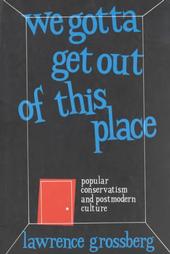We Gotta Get out of This Place: Popular Conservatism and Postmodern Culture

We Gotta Get out of This Place: Popular Conservatism and Postmodern Culture book cover
|
|
| Author | Lawrence Grossberg |
|---|---|
| Publisher | Routledge. |
|
Publication date
|
1992-05-21 |
| ISBN | |
| OCLC | 25025877 |
| 973.9 20 | |
| LC Class | E169.Z82 G757 1992 |
We Gotta Get out of This Place: Popular Conservatism and Postmodern Culture by Lawrence Grossberg was published in 1992 and deals with several aspects of (then) contemporary American culture: Lawrence Grossberg states that it is a book about “the political, economic and cultural forces which are producing a new atmosphere, a new kind of dissatisfaction and a new conservatism in American life”. Further, he discusses how commercialization, a lack of passion, and depoliticization causes a new conservatism in rock. A critical review of the book calls it "a highly ambitious and intriguing work, if an ultimately flawed one."
Lawrence Grossberg explains that the rising number of attacks on rock music only show the Right’s ambiguous relationship to popular culture.
Attacks on rock music are usually produced by Christian fundamentalist movements and an “elitist fraction of a new conservative alliance”, who see rock as the main cause for “a certain fall from grace”.
Grossberg distinguishes between more organic forms of rock music, which sometimes characterize the 1960s, for example, and those of the 1980s, whose texts were highly choreographed by the culture industry (record labels, MTV, music magazines, etc.).
For Grossberg, the Reagan and Thatcher revival of conservatism can be understood in terms outlined by Antonio Gramsci. A popular hegemony sought to defang the critiques of the counterculture and reinscribe youth culture in the service of corporate capitalism.
On the surface, this form does not resemble an attack but it uses rock music and reconstructs its meanings and significance. Thus, conservative Christian groups can use rock in order to spread their “fundamentalist and conservative messages”.
Grossberg further states that these attacks on rock are actually quite paradoxical, as rock has become “part of a dominant mainstream culture” and thus, “rock is losing power to encapsulate and articulate resistance and opposition””. According to Grossberg, however, the new conservatives try to regulate the “possibilities of pleasure and identity as the basis opposition and to dismantle the cultural and political field constructed in the 1960s".
...
Wikipedia
